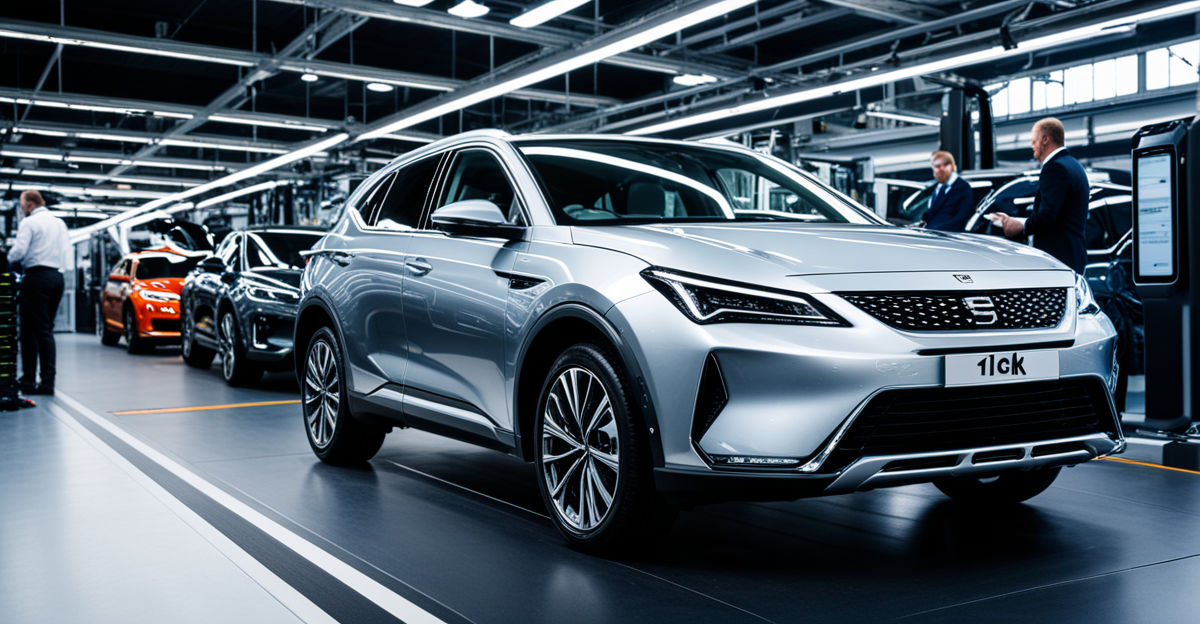The Influence of Technological Advancements in the UK Automotive Sector
Technological innovations have rapidly reshaped the UK automotive sector, driving significant changes in production, design, and consumer engagement. These advancements—from electric drivetrains to connected vehicle systems—are no longer futuristic concepts but active drivers of the industry’s evolution. The industry influence is profound, as UK manufacturers leverage cutting-edge technology to bolster market competitiveness while adhering to stringent environmental standards.
Recent UK automotive trends include the integration of sophisticated sensors and AI tools enabling autonomous capabilities, alongside enhanced connectivity fostering vehicle-to-infrastructure communication. These technologies not only improve safety and efficiency but also redefine user experiences. The transition towards electrification exemplifies how the sector adapts to global demand shifts, fortifying the UK’s position as a leader in automotive innovation.
Also read : How Can We Transform the Future of the UK Automotive Industry?
Early market responses reflect both enthusiasm and caution. Stakeholders recognize the potential for growth and disruption, with firms investing heavily in R&D to harness technological benefits. However, challenges such as infrastructure development and regulatory frameworks require collaborative action. Overall, these innovations signify a pivotal moment for the UK automotive sector, with sustained momentum likely to influence future market dynamics and technological adoption nationwide.
Electric Vehicles and Charging Infrastructure Shaping the Market
Electric vehicles UK adoption has surged, driven by growing environmental awareness and supportive policies. The expansion of EV charging infrastructure is critical to sustain this momentum, yet challenges persist, including uneven geographic coverage and the need for faster charging solutions. These limitations affect consumer confidence, slowing broader adoption despite increased availability of electric vehicles UK models.
Also to discover : What are the key trends shaping the UK automotive market?
Government initiatives encourage infrastructure development through grants and public-private partnerships, reflecting a commitment to sustainable mobility. Improving charging accessibility directly influences consumer behaviour, making electric options more practical for daily use. This infrastructure growth also aligns with UK targets for carbon reduction in transport.
Electric vehicles’ impact extends beyond ownership to influence urban planning and energy management. As the vehicle fleet becomes increasingly electric, integration with renewable energy sources creates opportunities for smarter grids and reduced emissions. Consumers show higher interest in electric drivetrains when charging is convenient, highlighting the interdependence between EV charging infrastructure and market demand.
In summary, the UK’s electric vehicles market hinges on continued investment in reliable and widespread charging networks to solidify sustainable mobility and support an environmentally conscious shift among drivers.
Artificial Intelligence and Automation Transforming Manufacturing
Technological innovations in automotive AI have revolutionised manufacturing processes within the UK automotive sector. Advanced AI-driven automation enables precise, real-time decision-making, optimising production flow and reducing errors. The deployment of robotics in car production integrates seamlessly with smart sensors and machine learning algorithms, increasing efficiency and consistency.
Smart manufacturing UK embraces these technologies to enhance flexibility in assembly lines, allowing rapid adaptation to changing designs or customised orders. This flexibility is crucial as UK automotive trends increasingly favour bespoke and interconnected vehicles. Furthermore, AI systems can predict maintenance needs, minimising downtime and associated costs.
The influence of these advancements extends to workforce dynamics. Automation reshapes job roles, demanding higher technical skills while phasing out routine manual tasks. Upskilling initiatives become vital to prepare employees for collaboration with intelligent machines. Industry leaders acknowledge both the productivity gains and the necessity for strategic workforce development in this transformation.
Overall, AI and robotics are not just tools but catalysts, significantly shaping operational efficiency and competitive advantages within the UK automotive sector. Their integration signals a future where manufacturing agility and data-driven insights stand at the core of automotive innovation.
Commitment to Sustainability and Green Technologies
Commitment to sustainable automotive UK practices is increasingly central to industry strategies. UK automakers focus on integrating green car technologies through eco-friendly materials and energy-efficient production methods. For example, manufacturers are adopting recycled composites and biodegradable components that reduce environmental impact without compromising vehicle quality or performance.
In pursuit of carbon neutrality, leading players have set ambitious targets aligned with national climate goals. This includes transitioning production facilities to renewable energy sources and minimizing waste throughout supply chains. Government policies actively support these efforts via incentive programmes that encourage investment in cleaner technologies and promote electric vehicle adoption.
Sustainability initiatives also extend to lifecycle management, such as battery recycling and vehicle end-of-life processing. These endeavours form part of a comprehensive approach to environmental responsibility within the UK’s automotive landscape.
By embedding sustainability into design and manufacturing, the sector underscores its industry influence in combating climate change while meeting evolving regulatory demands. This dual focus not only advances ecological goals but also strengthens the UK’s competitive position in the global automotive market. The continued development and adoption of green car technologies illustrate how sustainability drives innovation and shapes future UK automotive trends.
The Influence of Technological Advancements in the UK Automotive Sector
Technological innovations in the UK automotive sector have accelerated significantly, shaping production methods and product offerings. Recent UK automotive trends highlight the integration of electric drivetrains, connected vehicle systems, and autonomous features, which collectively redefine mobility and market expectations. These advancements enhance vehicle safety and efficiency while creating new user experiences through enhanced connectivity and automation.
The industry influence of these technologies extends beyond manufacturing to impact UK market dynamics profoundly. Automakers adopting these innovations gain competitive advantages by meeting environmental regulations and consumer demand for smarter, cleaner vehicles. This transformation encourages investment in research, infrastructure, and talent development.
Early market reactions reveal a blend of eagerness and caution. Consumers show increasing interest in electric and connected cars, although concerns about infrastructure and technology reliability persist. Similarly, businesses recognize both the disruptive potential and necessity of adapting to maintain relevance.
Collectively, these technological shifts mark a pivotal phase for the UK automotive sector, spurring innovation that influences both domestic markets and global positioning. Continued emphasis on automotive innovations underpins the sector’s resilience and strategic growth amid evolving mobility landscapes.
The Influence of Technological Advancements in the UK Automotive Sector
Technological automotive innovations in the UK continue to reshape the sector, with electric, connected, and autonomous vehicles at the forefront of current UK automotive trends. These advancements impact not only vehicle design but also manufacturing processes and market strategies, enhancing safety, efficiency, and user experience. The integration of connectivity features, such as vehicle-to-infrastructure communication, exemplifies this shift toward smarter mobility.
The industry influence of these technologies is substantial. Automakers leveraging innovations secure competitive advantages by aligning with stringent environmental standards and evolving consumer preferences. Electrification and autonomy influence competitive dynamics, pressuring legacy manufacturers to accelerate R&D investments. Early market responses reflect cautious optimism; consumers value eco-friendly and connected features but remain mindful of infrastructure readiness and system reliability.
Moreover, the sector-wide adoption of these technologies propels complementary developments, including digital services and adaptable supply chains. This synergy fosters innovation that transcends vehicle manufacturing to affect broader mobility ecosystems. Overall, the UK’s proactive embrace of technological change ensures it remains competitive in a rapidly evolving global automotive market.
The Influence of Technological Advancements in the UK Automotive Sector
Technological automotive innovations continue to be pivotal in shaping the UK automotive sector’s landscape. Recent UK automotive trends highlight a shift toward integrating electric powertrains, enhanced connectivity, and autonomous functions, which collectively influence vehicle design and manufacturing processes. These innovations drive increased efficiency and safety while transforming user interaction through smarter vehicle systems.
The industry influence of these advancements extends to market competitiveness and strategic investment. Automakers adopting these technologies navigate complex regulatory environments and evolving consumer preferences for cleaner, more intelligent vehicles. This positions the UK as a key player in the global automotive industry, fostering continuous R&D efforts.
Early responses to these innovations are mixed, with enthusiasm tempered by concerns around infrastructure readiness and technology reliability. Consumers express growing interest in electric and connected vehicles but seek assurances regarding support systems like charging networks and software updates. Simultaneously, manufacturers balance innovation with risk management, adapting production lines and developing partnerships to meet these evolving demands.
Overall, the integration of automotive innovations shapes current UK automotive trends and exerts considerable industry influence, marking a transformative era focused on sustainability, digitalisation, and advanced mobility solutions.






